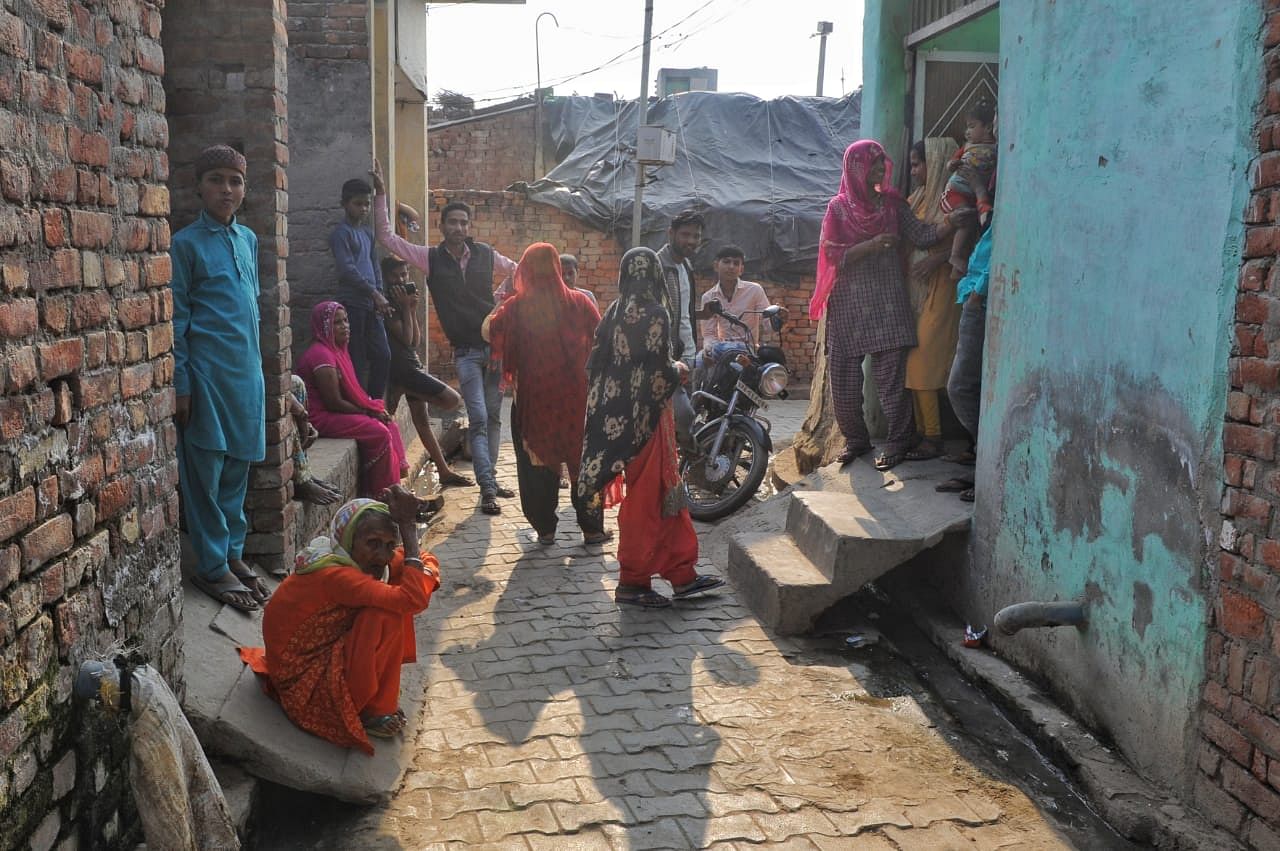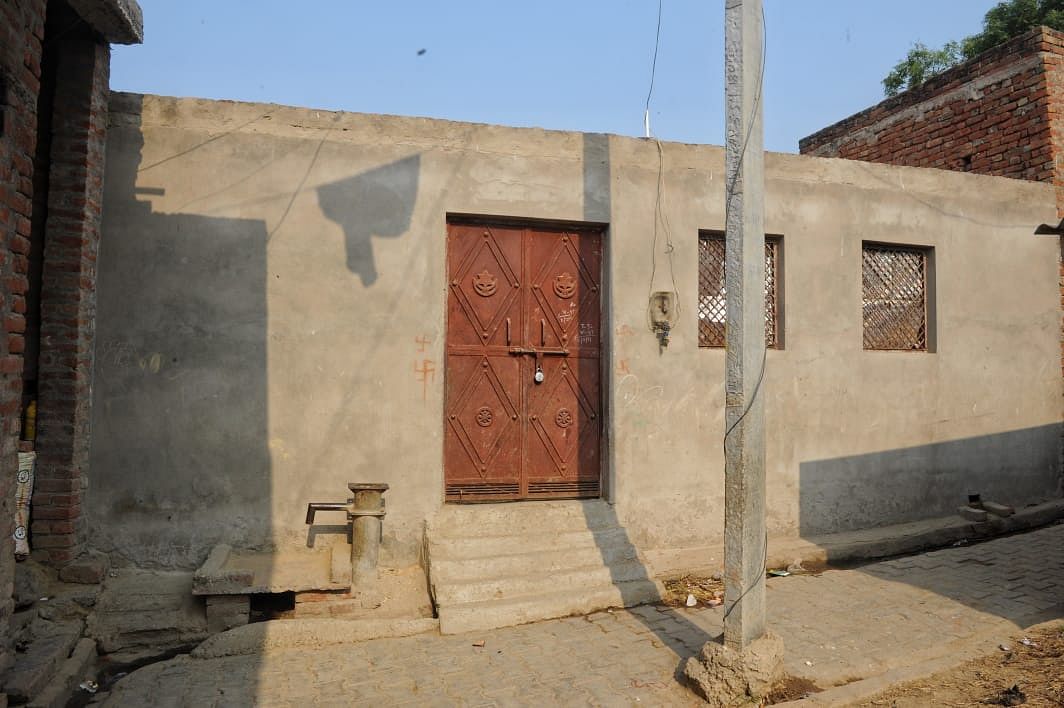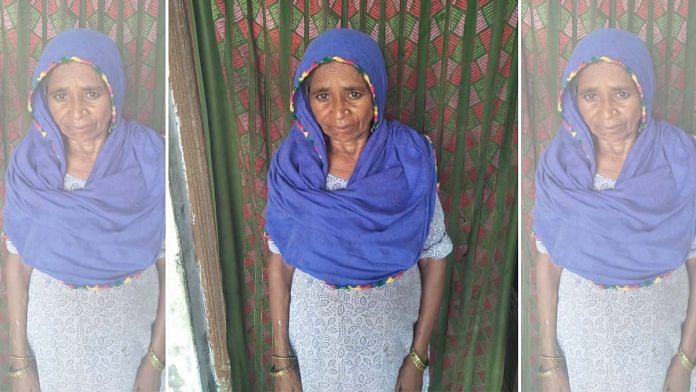Gudau, Etah: If a National Register of Citizens were to be compiled today, one would think Bano Begum’s citizenship would be secure. She has been living in a small village called Gudau near Jalesar in Etah, Uttar Pradesh, for over 40 years, and was born in India.
Bano is married to Akhtar Ali, and the couple have two children: Son Naeemuddin, who works as a labourer in Gurugram, Haryana, and daughter Asma Parveen, who lives with her husband and family in Mathura.
Bano holds a small parcel of land which her family claims was allotted to Akhtar’s grandfather by the gram panchayat. She has two buffaloes and a dozen goats through whom she earns a living. She has a voter ID card, a ration card and an Aadhaar card, and has been voting regularly in elections since the 1980s.
But there’s one problem Bano would face in an NRC — she is a Pakistani national.
Also read: Khap panchayats — the role & history of complex social institution in Haryana & western UP
FIR filed, fugitive Bano arrested
The curious case came to light when village secretary Dhyanpal Singh filed a complaint on 1 January this year against Bano after she was elected interim head of the gram panchayat, when elected head Shehnaz Begum died. Bano had been a member of the panchayat since 2015.
This didn’t go down well with Shehnaz’s relative Amir Hasan, who alleged that she was elected in a closed committee and didn’t have any real support.
“I didn’t like that she took over as pradhan, especially because she was made the head by a different group in a closed committee. They wanted to use her to their own advantage because she’s illiterate and doesn’t know much,” Hasan told ThePrint standing in a field in Gudau.
“I didn’t have a problem with her living here even though she’s from Pakistan, but I raised the issue after she became pradhan. I knew she’s here on a visa because police used to come here regularly for verification,” he added.
An FIR was registered against Bano Begum on 1 January, and she fled the village shortly after. After absconding for more than a month, she was arrested on 12 February and has been in judicial custody ever since.
The UP Police, upon further investigation, concluded that Bano is a Pakistani national and booked her under sections 420 (cheating), 466 (forging document), 468 (forgery for the purpose of cheating), 471 (knowingly using forged document) and section 14 of the Foreigners Act, 1946.
However, a different Bano Begum who lives in the same village told ThePrint that her namesake was a simple woman who would graze her cattle and got embroiled in village politics.
“I don’t know anything about her being a Pakistani, but she was a simple woman, a bride of the village who’d graze her cattle and live a simple life. What’s happening is unfortunate,” she said.

Also read: Pakistan wants to geotag Himalayan pink salt & Karachi Zoo’s ‘half-fox, half-woman’ star
A Pakistani born in India
According to Bano’s visa extension application documents shown to ThePrint by the family, she was born near Achnera in Agra district, Uttar Pradesh, in 1968. When Bano was three years old, she went to Pakistan with her family in 1971 to visit relatives who had moved across after Partition. There, all the family’s documents were apparently lost to theft.
In a letter written by Bano’s father Sadik Ali in 1984 — which was shown by the family to ThePrint but whose authenticity couldn’t be verified — her father couldn’t get any help from the Indian government or cooperation from the Pakistani government because of the 1971 war.
“I didn’t get any cooperation from the Pakistani government back then and was forced to take up citizenship,” Sadik Ali alleged in the letter.
Javed Ali, Bano and Akhtar’s son-in-law, narrated the story over the phone. “With the help of a handful of relatives there, Bano’s father secured Pakistani citizenship and stayed in the country from 1971 to 1979,” he said.
Bano and her sister Jahara are then said to have accompanied their father in returning to India on his passport and visa as minors in 1979. The date of acquiring her present nationality in her documents has been listed as 4 June 1979, the year she allegedly travelled back to India from Pakistan, effectively making her a Pakistani citizen.

“A person who has visited India on a Pakistani passport ceases to be an Indian citizen under section nine of Citizenship Act (1955), unless applied for citizenship. Which, in this case, hasn’t happened,” sources in the Ministry of Home Affairs told ThePrint.
Section 9 of the Citizenship Act 1955 deals with the termination of citizenship. It says that if any citizen of India acquires the citizenship of any other country voluntarily, by whatever means, ceases to be a citizen of India. Sub-section 2 says that the government has the final word on when and how a citizen acquired foreign citizenship.
The family claims she doesn’t hold a Pakistani passport, but has been getting visa extensions on a regular basis since then. Her sister has also been living on visa extensions.
“She came to India on her father’s passport, listed as a minor and the extensions are being given on this document through which she entered India. There’s no restriction on the number of Long Term Visas that can be granted, which is why she has been regularly obtaining extensions. Her current visa is valid till August 2022,” MHA sources added.
The sisters got married in the 1980s, after which they were granted long-term visas, which Pakistani and Bangladeshi women married to Indian nationals are eligible to get, renewed every two years.
Illiterate and poor, the sisters never applied for Indian citizenship, “As far as I know, they applied for citizenship only once, after getting married. But they’re poor and illiterate, I don’t think they applied again,” Javed added.
The police are now trying to ascertain how Bano obtained her voter ID, ration and Aadhaar cards.
K.P. Singh, SHO of Jalesar police station, told ThePrint an inquiry has been initiated to find out how Bano got her name in the voter list.
“The DM has set up an inquiry to find out how she got her name in the voter list, got an Aadhaar card. Action could be taken against other accomplices who nominated her as well, and helped her obtain Indian documents,” he added.
Village politics
At the heart of this issue lies village politics — specifically a land feud between Bano’s family and Amir Hasan. His relative’s death followed by Bano’s appointment as interim panchayat head in her place was not acceptable to him.
A village resident and former panchayat member, who didn’t want to be named fearing isolation, claimed: “There’s a land dispute between Bano and Amir Hasan on a 120-yard plot, which they’re also contesting in court. Hasan himself put Bano on the gram panchayat committee to implicate her and discredit the family to get a hold of the land,” he said.

Bano’s son Naeemuddin who works as a labourer in Gurugram also made the same allegation, but added that Hasan was also after Rs 5 lakh from the panchayat account, which Bano and Akhtar had refused to release.
Because of this feud, Akhtar blew the whistle on Bano’s nationality.
On 5 March, Bano’s bail application was denied by district court, Etah. The family is now gearing up to approach the Allahabad High Court.
“I argued that she should be given bail until the trial is complete since she’s not an immediate threat,” Bano’s lawyer B.P. Singh told ThePrint.
“But the bail application was denied because the judge said she knew she’s a Pakistani national and yet went ahead and contested elections and even got Indian documents made. Since she has been booked under all non-bailable offences, she wasn’t given bail,” he added.
Also read: MP leads in land record digitisation for second year in a row, Bihar shows most improvement




Not totally surprising with the type of people in the government and government offices, where money speaks louder. While Pakistan and Bangladesh are for their nationals normally, India is for the citizens from these countries too. Because there are more people with love for the people from these countries than the case vice versa. The advantageous factor for the people of this community in particular is they are totally indistinguishable when they mix with Indians from the same community. Their physique, Clothing, food habits, language style of living etc., are all the same which make it difficult to identify them.
Such cases are found aplenty in the border states. Lakhs of Pakistani and Bangladeshi nationals are residing in India and have all govt documents and ID proofs. Its easy to understand who helped them with documents like Voter ID and why. Its also quite easy to figure out which political parties these illegal immigrants vote for.
The case is clear. She is a oak national and she cannot have voter id and aadhar. The circumstances of why she had to get pakistani citizenship is immaterial.
I never believed my friends from north india who said many pakistani people got aadhar, voter cards and all, I am doubting my self now.
if she is really innocent why did she escape for one month??
how many more people are present like this?
is it so easy for foreigners to get a voter card and all other documents in our country ??
these are some of the questions that our previous and current governments(entire polity) should answer to citizens.
It’s unfortunate but a lot of constituencies in INDIA might suprise INDIANS with their love of pakistani warmongers.